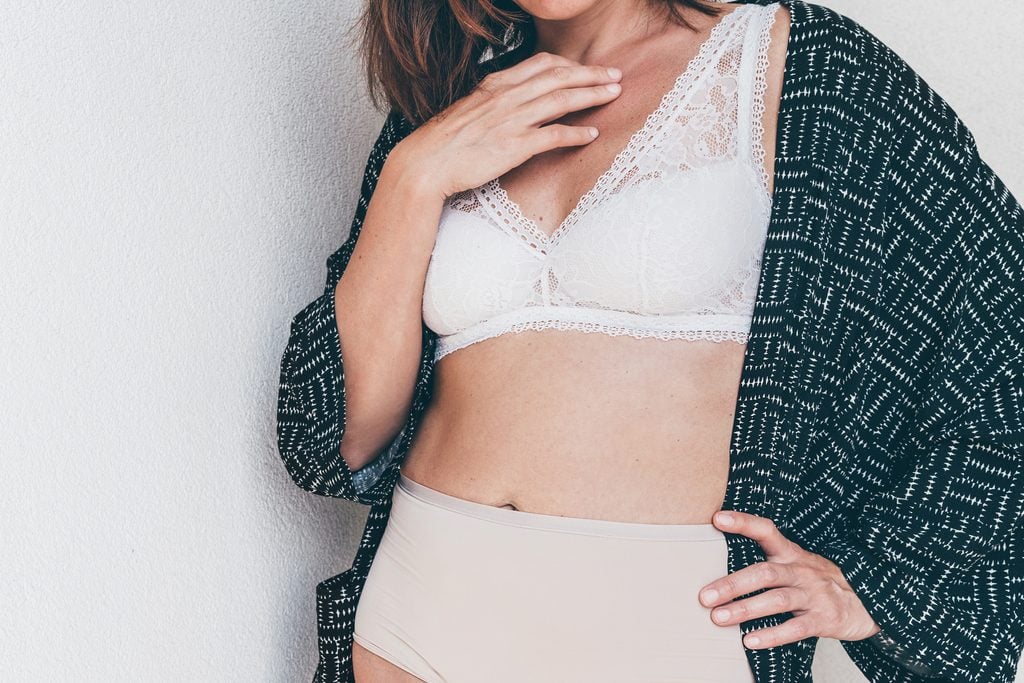9 Ways Your Breasts Can Change As You Age
Updated: Oct. 10, 2022

Not all breast changes signal cancer. See what the decades have in store for your gals with this guide to how breasts change with age.
Buds turn into full-blown breasts
You may not remember when you went from having childish swellings on your chest to bonafide breasts, but did you know your ladies probably kept growing even after that initial growth spurt, even if you couldn’t tell? “Breasts usually continue to grow for at least five years after you first get your period and enter puberty, though it varies,” says Alexes Hazen, MD, associate professor in the Hansjörg Wyss Department of Plastic Surgery at NYU Langone Medical Center in New York. When you start developing breasts has no bearing on how large they’ll ultimately be.
Your breasts in your 20s and 30s
Once your boobs are fully developed, they look and feel about the same throughout your 20s and into your early 30s. The round mounds are covered in tight, smooth skin and they may feel firm because of the dense tissue that makes them up. Find out 13 things your breasts aren’t telling you.
They may temporarily swell
Even though your breasts are as big as they’re naturally going to get by the time you exit your teens, they can still fluctuate in mass during hormonal changes such as your period, pregnancy, or general weight changes. “One big influencer on breast size is hormonal changes. Weight gain and weight loss throughout life can also make a big difference; some people gain weight directly in their breasts, so they grow larger and then shrink once you lose the weight,” says Dr. Hazen. If your boobs balloon while breastfeeding, they usually go back to their original size once you’re finished. Read up on the reassuring reasons behind breast tenderness.
Your nipples can change
Besides growing larger because of hormones and all that milk, pregnancy can also alter the color of your areola (it darkens) and enlarge your nipples. “A lot women first know they’re pregnant by the fact that their breasts are little bigger and look different,” says Dr. Hazen. Post-pregnancy, your areola should lighten back to its natural shade; and while the nipples typically revert to a more normal look they can sometimes remain larger permanently. However, some nipple or breast changes could be a sign of breast cancer.
They may get softer
By the time you pass 30, you’ll probably notice your breasts feeling softer. While it could happen with weight gain, it’s probably just aging. “They go from feeling really firm to much softer because that dense connective tissue is replaced with breast fat,” says Dr. Hazen.
They can droop
If you’re approaching or past menopause, don’t be surprised if you see changes in the shape of your breasts. “As we age, skin stretches out and sags, so that’s why there’s that droop and they hang down lower, even if they’re not necessarily that big,” says Dr. Hazen. “People think of large breasts drooping but smaller ones will sag over time, too.” If it’s a concern to you, try wearing a soft, comfortable bra at night; this provides support as you sleep.
They may lose volume and skin grows looser
“Skin loses elasticity and the thickness of the dermis, which allows for a lot of tightness, thins out and becomes looser,” says Dr. Hazen. “And, after menopause women’s estrogen levels decrease, which can cause them to lose breast volume.”
They’re sensitive to the sun
If you want to protect your breasts, don’t forget your chest when you’re slathering on sunscreen. “If some breast skin is exposed it will age just like any other skin on your body that is exposed to sun. It can get wrinkly,” says Dr. Hazen.
They may lose sensitivity
“Sensations you feel around the nipple and areola comes from nerves inside the chest,” says Dr. Hazen. “If you have small breasts, the distance to the nerves is really short, so you may have more sensitivity. As they grow or droop over time, though, that nerve gets stretched out and the sensation may lessen.” Though some changes are unavoidable, there are still things you can do to keep your breasts healthy and decrease your chance of breast cancer.